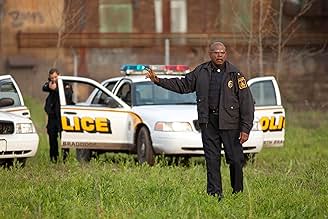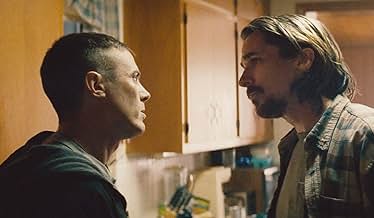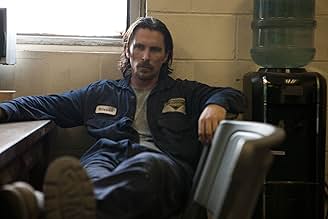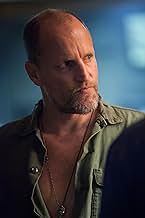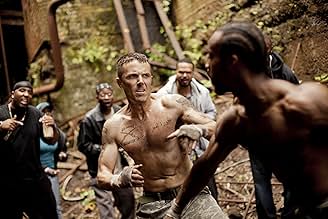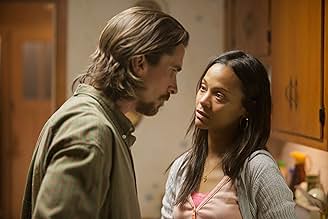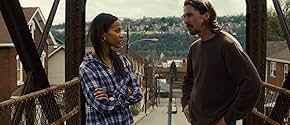A steelworker takes matters into his own hands after police fail to find his missing brother.A steelworker takes matters into his own hands after police fail to find his missing brother.A steelworker takes matters into his own hands after police fail to find his missing brother.
- Awards
- 1 win & 10 nominations total
Zoe Saldaña
- Lena Taylor
- (as Zoë Saldana)
Nancy Mosser
- Woman at Drive In
- (as Nancy Mosser Bailey)
- Director
- Writers
- All cast & crew
- Production, box office & more at IMDbPro
Featured reviews
The story was interesting and shows once again the injustice in life.
The action was varied and it didn't get boring.
Overall, a good drama with a fair ending.
To be honest, after watching the trailer, i watched this movie only cause it had Bale in it. But it turned out to be surprisingly good with strong performances from everyone involved. Casey Affleck and Zoe Saldana deliver good work on screen. Woody Harelson is also very convincing as the Red neck villain. The director has managed to paint a pretty vivid picture of the environment that he wanted to portray. The storytelling is very engaging. Thumbs up to the director and his team for this effort. In the end, no review can be complete without praising the man who continues to amaze with each performance, Christian Bale. Believable and heart warming in this one. He manages to accomplish the one thing which was most needed from anyone who played this character and that is being able to get the audience to empathize with it. Bale succeeds and then some. Clearly one of his best works till date, and he has an impressive resume already to choose from. A must Watch movie of 2013.
This is one among the finest movies i have ever seen. One of the best performances by Christian Bale, Casey Affleck, Woody Harrelson. A must watch. I don't know why it's so low rated.
Weeks before I took the time to see Out of the Furnace on its opening day today, I saw an interview with the cast where star Christian Bale made a comment about how the script and the character really stuck with him before he'd ever agreed to take the role. While I normally hate to see a film based on something ANY of the actors involved have said (because really, who WOULDN'T give their film a nice push to the press?), I had a gut feeling I'd want to see this one. It's a good thing I tend to go with my gut, because if you watch for two hours with an open mind, Out of the Furnace is certainly filled with dilemmas people across America STILL face on a daily basis -- and that alone is why it will hit too close to home. It is why some people will say it is "too" gritty, "too" depressing, "too" much of something.
I'm a New Jersey native, and my state is filled with many towns that are run down and haven't seen anything positive happen in them in decades. A town not far from me lost its heart when a tea factory was forced out and jobs outsourced to China in the 90s. Just across the border, 20 minutes into Pennsylvania, is an old steel town (not the one in the film) that drove workers out of their mills in the 80s, the old blast furnaces still towering over the "south side" of town that is dotted with row homes. If you've ever driven through Michigan, at least a handful of cities there would paint the same picture as anything you'll see in Out of the Furnace. In Indiana, the same. I point this out because several moviegoers in the theater where I saw the film were saying that Out of the Furnace paints an unrealistic portrait of the "worst" parts of America, making them seem worse than they are. But until people have lived that lifestyle, it's easy to say that it doesn't still exist. What I appreciated about Furnace is that Cooper had the guts to make a gritty film that points out that there are towns filled with good people who can never get beyond their "hard times".
Is it unrealistic, perhaps, to assume that bare-knuckle fighting rings are organized nationwide? Perhaps. It doesn't mean, however, that there aren't plenty of illegal activities happening at the hands of "desperate" men (many of our nation's veterans are homeless, don't forget). Cooper chose Braddock as a great setting for this film, and he chose great actors to portray "everyman". And honestly, I see why he waited for Christian Bale to come around to making this film; nobody could have pulled off Russell Baze the way that Bale does -- with his quiet desperation, his eyes telling you everything that is churning in his gut, the weariness settled into his body making him sometimes appear aged beyond his years. Where Bale brings a quietness to Russell, Casey Affleck brings the loud emotive bursts and the scrappiness of his youth to Rodney Baze, and the two work wonderfully in balancing the "brotherhood" aspect of the film. While I fault Cooper for failing to tell us more of the relationship between the two, I feel that both actors worked hard to bring the familial bond to the forefront of the story.
There are several aspects to the storytelling that are to be admired. For one, the juxtaposition between Russell out hunting while his brother is being driven to what could potentially be his death match -- a "hunt" of his own -- was brilliant in its pacing. The same can be said for the scene where we assume the "bad" guy (Woody Harrelson taking a terrifying turn as the film's antagonist) is going to finally be caught by the law enforcement swarming his home. And finally, the bridge scene between Russell and Lena (Baze's girlfriend played admiringly well by Zoe Saldana) is one that gives a heart to a film that is otherwise dark and depressing. It's because of moments like these that I was able to overlook the film's obvious flaws. There is patchy storytelling (blame the script writers), but the actors all grab hold of the material they've been given and work well with it despite its shortcomings. What I ultimately applaud Out of the Furnace for is the fact that these characters could still represent many people in this country and throughout the world. How far would we ALL go, trying so hard to be "good" day in and day out, waiting for a break, trying to earn the extra dollar...before we got tired of the rest of the world getting ahead without us, and we take matters into our own hands?
Out of the Furnace poses this thought-provoking question and lets the viewer see how you can go down either path. Everyone wants to say that they'd still stay on the straight and narrow, but until you can put yourselves into the shows of these characters, you just truly never know. Ask yourself what you would do if Rodney Baze was YOUR brother? How far would you go for family -- for a family member who had put his own life on the line for this country? How far would you go in a town where everything else had shut down around you? Cooper doesn't give us the best film of the year with Out of the Furnace, but he and this cast give you plenty to think about long after the credits roll.
I'm a New Jersey native, and my state is filled with many towns that are run down and haven't seen anything positive happen in them in decades. A town not far from me lost its heart when a tea factory was forced out and jobs outsourced to China in the 90s. Just across the border, 20 minutes into Pennsylvania, is an old steel town (not the one in the film) that drove workers out of their mills in the 80s, the old blast furnaces still towering over the "south side" of town that is dotted with row homes. If you've ever driven through Michigan, at least a handful of cities there would paint the same picture as anything you'll see in Out of the Furnace. In Indiana, the same. I point this out because several moviegoers in the theater where I saw the film were saying that Out of the Furnace paints an unrealistic portrait of the "worst" parts of America, making them seem worse than they are. But until people have lived that lifestyle, it's easy to say that it doesn't still exist. What I appreciated about Furnace is that Cooper had the guts to make a gritty film that points out that there are towns filled with good people who can never get beyond their "hard times".
Is it unrealistic, perhaps, to assume that bare-knuckle fighting rings are organized nationwide? Perhaps. It doesn't mean, however, that there aren't plenty of illegal activities happening at the hands of "desperate" men (many of our nation's veterans are homeless, don't forget). Cooper chose Braddock as a great setting for this film, and he chose great actors to portray "everyman". And honestly, I see why he waited for Christian Bale to come around to making this film; nobody could have pulled off Russell Baze the way that Bale does -- with his quiet desperation, his eyes telling you everything that is churning in his gut, the weariness settled into his body making him sometimes appear aged beyond his years. Where Bale brings a quietness to Russell, Casey Affleck brings the loud emotive bursts and the scrappiness of his youth to Rodney Baze, and the two work wonderfully in balancing the "brotherhood" aspect of the film. While I fault Cooper for failing to tell us more of the relationship between the two, I feel that both actors worked hard to bring the familial bond to the forefront of the story.
There are several aspects to the storytelling that are to be admired. For one, the juxtaposition between Russell out hunting while his brother is being driven to what could potentially be his death match -- a "hunt" of his own -- was brilliant in its pacing. The same can be said for the scene where we assume the "bad" guy (Woody Harrelson taking a terrifying turn as the film's antagonist) is going to finally be caught by the law enforcement swarming his home. And finally, the bridge scene between Russell and Lena (Baze's girlfriend played admiringly well by Zoe Saldana) is one that gives a heart to a film that is otherwise dark and depressing. It's because of moments like these that I was able to overlook the film's obvious flaws. There is patchy storytelling (blame the script writers), but the actors all grab hold of the material they've been given and work well with it despite its shortcomings. What I ultimately applaud Out of the Furnace for is the fact that these characters could still represent many people in this country and throughout the world. How far would we ALL go, trying so hard to be "good" day in and day out, waiting for a break, trying to earn the extra dollar...before we got tired of the rest of the world getting ahead without us, and we take matters into our own hands?
Out of the Furnace poses this thought-provoking question and lets the viewer see how you can go down either path. Everyone wants to say that they'd still stay on the straight and narrow, but until you can put yourselves into the shows of these characters, you just truly never know. Ask yourself what you would do if Rodney Baze was YOUR brother? How far would you go for family -- for a family member who had put his own life on the line for this country? How far would you go in a town where everything else had shut down around you? Cooper doesn't give us the best film of the year with Out of the Furnace, but he and this cast give you plenty to think about long after the credits roll.
An all-star cast, comprising Christian Bale, Casey Affleck, Woody Harrelson, Forest Whitaker, Willem Dafoe, and Zoe Saldana (wow!), is cast into the cavernous of troubles. Two brothers- one a former solider who served in Iraq (Rodney, played by Casey Affleck) and the other an impoverished factory worker (Russell, played by Christian Bale) - embark on vastly disparate paths. Their relationship has lost its bygone flare, considering Rodney's extensively damaged psyche and his desire to stray away from standard work, instead choosing to make money off of brutal street fighting and gambling. When he asininely involves himself with ruthless wagering criminals (led by Woody Harrelson), all circumstances invert and numerous lives are consequently affected.
The first half of the film carries an incredibly strong premise and features a truly gripping narrative that focuses on character development/characterization, which compellingly leads to the ultimate predicament. In essence, a major portion of the film's enticement should be accredited to the exceptionally powerful performances, and Casey Affleck remarkably fights for that recognition by showcasing his deteriorating soul. I mention Affleck specifically because he rarely receives ample praise for his impressive renditions. Furthermore, in that first half, the pacing is smooth and adequate as you sympathize with these distressed characters and are stunned by a sudden unfortunate incident after another, personalities still further strengthening. The arresting visual look of the film partially produces that final element of attraction to the end product.
As we proceed though and the midpoint sequence comes and goes, the pacing suddenly decelerates and we encounter additional characters and arcs that are frankly unnecessary and don't benefit the picture in any way. Once the credits roll, you don't feel like Forest Whitaker's character deserved the amount of screen time he ended up with, portraying an archetypal police officer and barely anything more. We're met with countless prolonged and dispensable scenes that are more stereotypical than beneficial to the film's substance and overall plot. The excitement of the first half, fueled by unpredictability and conflict, takes a nosedive and the thriller chooses to tediously capture the lengthy search for the villain alternatively. Finally, the audience is presented with an anticlimactic conclusion that again feels far too familiar and unsatisfying despite the enthralling story beforehand. There's essentially nothing unique in its final act to induce the amount of memorability that the first half accomplished since it ends like your typical run-of-the-mill revenge flick.
In sum, Scott Cooper effectively conveys the rural and destitute atmosphere, and the film is genuinely gritty and honest in its depiction of labor and the unrewarding lives that are led by courageous soldiers upon returning home. These are the lives of a considerably high percentage of America's population and the movie's thematic material speaks volumes on this controversial and profoundly relevant matter. Out of the Furnace certainly forces its viewers to react in particularly shocking sequences, eliciting a variety of emotions. Even though the film's quality noticeably degrades while it advances, this tale will undoubtedly provoke intrigue and fervor until the screen fades to black.
The first half of the film carries an incredibly strong premise and features a truly gripping narrative that focuses on character development/characterization, which compellingly leads to the ultimate predicament. In essence, a major portion of the film's enticement should be accredited to the exceptionally powerful performances, and Casey Affleck remarkably fights for that recognition by showcasing his deteriorating soul. I mention Affleck specifically because he rarely receives ample praise for his impressive renditions. Furthermore, in that first half, the pacing is smooth and adequate as you sympathize with these distressed characters and are stunned by a sudden unfortunate incident after another, personalities still further strengthening. The arresting visual look of the film partially produces that final element of attraction to the end product.
As we proceed though and the midpoint sequence comes and goes, the pacing suddenly decelerates and we encounter additional characters and arcs that are frankly unnecessary and don't benefit the picture in any way. Once the credits roll, you don't feel like Forest Whitaker's character deserved the amount of screen time he ended up with, portraying an archetypal police officer and barely anything more. We're met with countless prolonged and dispensable scenes that are more stereotypical than beneficial to the film's substance and overall plot. The excitement of the first half, fueled by unpredictability and conflict, takes a nosedive and the thriller chooses to tediously capture the lengthy search for the villain alternatively. Finally, the audience is presented with an anticlimactic conclusion that again feels far too familiar and unsatisfying despite the enthralling story beforehand. There's essentially nothing unique in its final act to induce the amount of memorability that the first half accomplished since it ends like your typical run-of-the-mill revenge flick.
In sum, Scott Cooper effectively conveys the rural and destitute atmosphere, and the film is genuinely gritty and honest in its depiction of labor and the unrewarding lives that are led by courageous soldiers upon returning home. These are the lives of a considerably high percentage of America's population and the movie's thematic material speaks volumes on this controversial and profoundly relevant matter. Out of the Furnace certainly forces its viewers to react in particularly shocking sequences, eliciting a variety of emotions. Even though the film's quality noticeably degrades while it advances, this tale will undoubtedly provoke intrigue and fervor until the screen fades to black.
Did you know
- TriviaAfter filming was completed, Woody Harrelson walked up to director Scott Cooper, hugged him and said "I have never wanted to shed a character so badly in my life".
- GoofsWhen Rodney fights in NJ and is knocked out, the other fighter jumps on him and keeps hitting the left side of Rodney's face. When Degroat comes in the back room following the fight, the right side of Rodney's face is most damaged. Apparently they just got the sides mixed up.
- Quotes
Rodney Baze Jr.: I should have popped that motherfucker.
John Petty: That would be the last motherfucker you ever popped.
Rodney Baze Jr.: Am I supposed to be scared of him because he sucks on a lollipop?
- Crazy creditsThis film shot entirely and proudly on Kodak Film
- ConnectionsFeatured in The Tonight Show with Jay Leno: Episode #22.31 (2013)
- SoundtracksRelease
Performed by Pearl Jam
Written by Eddie Vedder, Jeff Ament, Stone Gossard, Dave Krusen and Mike McCready
Courtesy of Epic Records
By arrangement with Sony Music Licensing
- How long is Out of the Furnace?Powered by Alexa
Details
- Release date
- Countries of origin
- Official sites
- Language
- Also known as
- La ley del más fuerte
- Filming locations
- Production companies
- See more company credits at IMDbPro
Box office
- Budget
- $22,000,000 (estimated)
- Gross US & Canada
- $11,330,849
- Opening weekend US & Canada
- $5,220,288
- Dec 8, 2013
- Gross worldwide
- $15,661,554
- Runtime1 hour 56 minutes
- Color
- Sound mix
- Aspect ratio
- 2.39 : 1
Contribute to this page
Suggest an edit or add missing content

Top Gap
What was the official certification given to Les brasiers de la colère (2013) in India?
Answer






